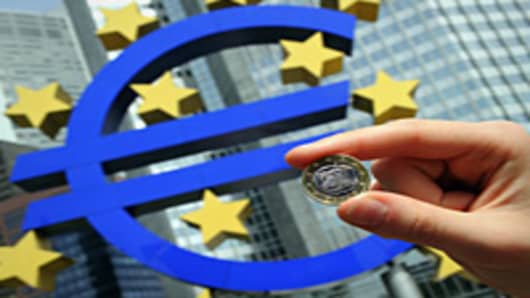What was once just a hypothesis among a close circle of economists is now cited by various pundits as one of the main reasons for market jitters: the break-up of the euro, the single currency that took years of patient negotiation and diplomacy to be born.
And not without reason, as some analysts think the dismantling of the euro zone or the exit of even one country would have incalculable consequences on markets.
"Complete break-up would have effects that dwarf the post Lehman Brothers collapse," ING analysts wrote in a market research.
Some experts think the process is about to happen because the currency union is not sustainable due to different levels of economic development among its members.
"In my view the euro will collapse within the next few months," Max King, investment strategist at Investec Asset Management, told CNBC. "It's completely unsustainable." (Click here for video interview).
On Thursday, the European Central Bank left its key interest rate unchanged at a record low 1 percent for the 14th month running.
Famous investor Jim Rogers was predicting the euro's collapse in 15-20 years but he also found a good buying opportunity in the single currency once most investors in the markets became bearish on it.
If only Greece exits the euro zone, the initial economic damage will be felt mainly by that country, with a fall in output of 7.5 percent, according to the ING research. The rest of the euro zone economies could see their output shrink by as much as 1 percent.
But if a complete break-up were to happen, the impact would be "dramatic and traumatic," ING analysts wrote.
In the first year, economies of various ex-euro zone members could shrink by between 5 percent and 9 percent and asset prices would plummet. The new currencies of peripheral economies would likely fall by 50 percent or more and they could see inflation rates soar towards double-digits, they wrote.
Meanwhile, Germany and the stronger countries, as well as the US, could suffer deflation as their currencies would appreciate because they would be seen as safe, according to the scenario described by ING.
Saving the Euro
"I was opposed to the euro , I think it was a great mistake to have monetary integration," Amartya Sen, winner of the Nobel Prize for Economic Sciences in 1998, told CNBC Thursday.
"We are stuck there and to break up would be the second-biggest mistake to do now, it would generate a huge amount of panic and concern," Sen said.
Markets, and to great extent economic policy, are "held hostage" by forces that are "to a great extent moved by herd behavior" and policy makers will have to take that into account when addressing the issue, he added.
The currency union can be saved and will have to be saved, Sen said. But for this to happen governments need to find the right approach to calm markets, he added.
"They have to think really how to tame that huge, slightly ignorant but extremely powerful force … what you would call the bond market vigilantes and so on," he said.
The Greek crisis "was managed badly by Europe" who now has to put on a show of unity to defend the whole currency union, Sen said, adding that politicians will have to persuade voters that it is acceptable to use public money to help weaker euro zone members.
"If you have money for integration you have to have some kind of a supportive policy on the part of the different European governments," he added.
Greece's only choice is to implement its tough austerity program, as "they are caught in a prison," he said.
Stimulating economic growth will be the main way for the country to overcome its high debt problem, according to Sen.


